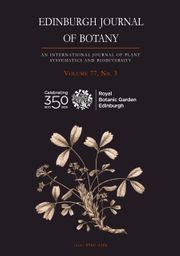Article contents
EARLY LINEAGES IN APIALES: INSIGHTS FROM MORPHOLOGY, WOOD ANATOMY AND MOLECULAR DATA
Published online by Cambridge University Press: 23 October 2001
Extract
Recent molecular studies indicate that the araliaceous tribes Myodocarpeae R. Vig. (Delarbrea Vieill., Pseudosciadium Baill. and Myodocarpus Brongn. & Gris.) and Mackinlayeae R. Vig. (Apiopetalum Baill., Mackinlaya F. Muell. and several genera of Hydrocotyloideae Link (Apiaceae)) comprise basally branching lineages within Apiales, an interpretation consistent with data from morphology and wood anatomy. Comparison of selected features in these genera, and in close relatives of Apiales, suggests that ancestral character states for the order may include: simple leaves, inflorescences in panicles of umbellules, flowers with articulated pedicels and a bicarpellate gynoecium, an andromonoecious, duodichogamous sexual system, septate fibres, the absence of radial canals, and the presence of paratracheal axial parenchyma in the wood.
Keywords
- Type
- Research Article
- Information
- Copyright
- © 2001 Trustees of the Royal Botanic Garden, Edinburgh
- 10
- Cited by


